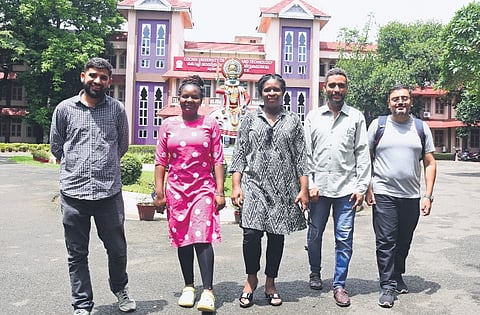

KOCHI: At a time when questions are being raised on the standard of education in Kerala, the upswing in the number of foreign students arriving in the state for higher studies paints an interesting picture.
Mahatma Gandhi University in Kottayam and the Cochin University of Science and Technology (Cusat) registered 885 and 1,600 foreign applications, respectively, this year. This is a climb from 571 and 1,100 applications from the previous academic year.
While big varsities are indeed the preferred destinations for foreign students, autonomous colleges have also pooled a significant number this academic year. One example is Rajagiri College in Kalamassery, where 60 foreign students have enrolled for various programmes.
“There’s a steady rise in the number of foreign students opting for Kerala and India as their academic home,” says Hareesh N Ramanathan, the director of international relations and associate professor (business management) at Cusat.
This is in stark contrast to the much-talked-about trend observed in Kerala of youngsters here moving abroad, citing the ‘sub-standard’ quality of education in the state.
“Who says that?” asks Shujaullah Khwajazada, from Afghanistan, who did his graduation and postgraduation studies in Kerala. He was so impressed by the system that when it came to deciding where to do his doctoral studies, he chose Kerala again — Cusat, to be precise. “I did my graduation and postgraduation in Calicut University,” he adds.
While students from African and Southeast Asian countries make up a significant portion of the foreign population at Kerala institutions, applications have also been received from the GCC countries and even the US and Canada.
The big allure
One of the things that international students find attractive about education prospects in the state and perhaps even the country is infrastructure.
Tanzania national Regina Babu and her friends Naomi Simiyu from Kenya, Ghamdan Alshamiri from Yemen and Motaz Alhassin from Sudan say that compared to their countries, the facilities available for students in Kerala and India are significantly better.
Regina, who is doing her doctoral studies at Cusat, speaks highly of the facilities available for research scholars here. “You won’t see such a vast amount of reference books and materials in universities in my home country,” she says.
Scholarships, too, are a big allure. It certainly was for Khwajazada. “But above all, it’s the peaceful atmosphere in Kerala that attracts us,” he says, adding, “The war has taken a toll on the education system in my country.”
For some others, like Naomi, the biggest attraction was the pleasant climate, though this is likely not very discernible now given the torrential downpour in the past few days.
“I did my postgraduation from Delhi Technological University. But I couldn’t adjust to the hot and dry climate there. Then, a friend, who had spent time in Kerala, suggested I come here, the God’s Own Country,” says the Naomi.
Another reason that these students, some of whom ventured out of their countries for the first time, point out is the behaviour of the natives. “We don’t feel like outsiders,” says Innocent Okello, a BSc Psychology student of Rajagiri College of Social Sciences, Kalamassery.
To illustrate his point, he narrates his journey after class. “I walk the roads here how I do so at home. It feels no different. But unlike Kenya, not everyone carries around a gun with them. Only security officers and policemen. Also, people are nice and often stop to check on my well-being.”
Of course, the food here needs some getting used to. “It took some time for me to get adjusted to the food in Kerala. You guys are on the spicier side of the hotness scale,” says Okello. The others second this opinion.
“But now, I have grown accustomed to it,” Okello adds. And so have the others.
Explaining more about food, Khwajazada says, “The North Kerala cuisine is more appealing to me. It’s likely because the food there has similarities to the dishes served back home, in Afghanistan.”
Another thing pointed out by the foreign students is the importance Keralites give to their culture, tradition and values. “My father did a thorough research before letting me apply for an undergraduate course outside my country. He found that Kerala and the people here hold similar values as we do back home,” recalls Tionge Tinashe Gausi, a Malawai national who’s doing BCom at Rajagiri College.
“The culture in the US and Europe is very different. People are busy and don’t have time for anyone, let alone a foreigner. That’s not the case in Kerala. Also, it’s much safer here,” Tionge adds.
Though the Western culture has made inroads into Kerala society, it has not caused many upheavals, says Tionge.
Regina concurs. “Keralites have taken only the good and are holding firm to their values. This is, as far as foreign students are concerned, a great allure,” she says.
Also, the wide acceptance of English in Kerala means foreign students need not struggle to learn the local language as they are required to if moving to Germany or say, China, Regina points out.
The wide acceptance and proficiency in technology is also a factor, points out Ghamdan Alshamiri, a Yemeni national, and Motaz Alhassin from Sudan. “There are a lot of foreign students enrolled in technology and multi-disciplinary courses here,” they say.
The final say
Perhaps the only concern that foreign students in Kerala varsities have is the fee structure. “It’s on the higher side compared to universities and colleges in North India,” they say. “If you try to self-finance the course, it burns a hole in your pocket,” says Ghamdan Alshamiri of Yemen.
“But it’s manageable if you can get a scholarship, like the one facilitated by the Indian Council for Cultural Relations,” says Okello who got a full scholarship from Rajagiri College.
“If I get an opportunity, I will return to Kerala to pursue my postgraduation. This truly is God’s Own Country,” Okello adds.
Regina, Naomi, Tionge and others chime in. “Students from Kerala are indeed very blessed.”